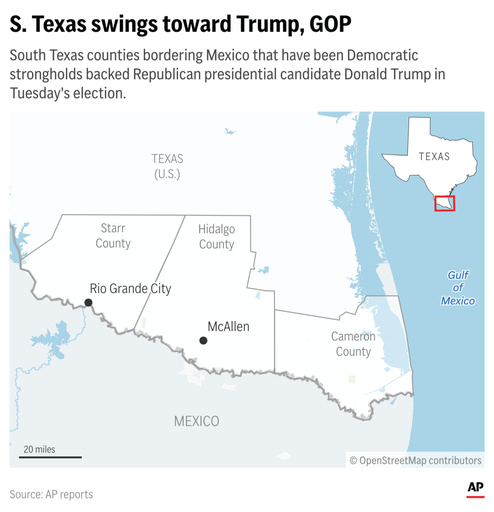
“`html
In Rio Grande City, Texas, the Bazán family, known for their long-standing support of Democrats, witnessed a significant shift in their political inclinations this year. Jorge Bazán, who works with the utility company, decided to break the family tradition by casting his vote for Donald Trump, motivated by a lack of confidence in the Democratic Party’s economic strategies. “I think they forgot about the middle class,” Bazán expressed, highlighting the struggles people face as prices continue to rise.
Historically, the South Texas region, which stretches from San Antonio to the Rio Grande Valley, has been a bastion for the Democratic Party. However, the political landscape began to shift notably in 2020, with Trump’s growing support causing alarm among Democrats in this predominantly Hispanic area. The unexpected voting patterns observed in the recent elections further solidified this shift, as Trump won major victories in several border counties, including Hidalgo and Cameron, both of which are among the most populous in the Rio Grande Valley.
Notably, Starr County, where Bazán resides, voted for a Republican presidential candidate for the first time in a hundred years. This county, primarily composed of Hispanic workers and characterized by its low average household income of $36,000, saw Trump secure a substantial 16-point lead over Vice President Kamala Harris.
This election outcome illustrates the movement of working-class voters toward the Republican Party, especially among those living along the Texas-Mexico border. Fazán’s sentiment isn’t an isolated incident; he’s echoed by many who have historically voted Democrat but felt compelled to realign their loyalties. Luis Meza, a 32-year-old from Starr County, expressed, “I was always a lifelong Democrat, but I decided to change to Republican with the political landscape that it is now.” He indicated that immigration issues played a significant role in his change of heart.
Meza noted that while he initially opposed Trump, he perceived insufficient changes under President Biden to continue supporting Harris. In stark contrast, Biden’s win in Hidalgo County was notably smaller than Hillary Clinton’s victory margin in 2016, reflecting a growing discontent among predominantly Hispanic and working-class voters who have felt let down by Democratic policies.
Republican endeavors in the region have surged, with millions spent to court voters who have become disillusioned. This trend extended to the most contested political races across several counties, where Republican candidates started to make significant inroads. For instance, Republican Monica De La Cruz had a strong showing in the 15th Congressional District, while Democratic incumbents struggled to maintain their grip on their positions.
Democratic Representative Henry Cuellar managed to avoid defeat against a newcomer in the most closely watched contest of his long career. Cuellar faced challenges, including an indictment over bribery allegations that have tarnished his image, particularly in a district that includes Rio Grande City. Similarly, Representative Vincente Gonzalez had a narrow escape against a challenger he easily defeated two years prior.
On a national scale, data reflected a slight dip in support for Vice President Harris among Black and Latino voters compared to Biden’s earlier standing. While Harris attracted over half of Hispanic voters, it marked a decrease from the approximately 60% support Biden garnered in 2020. Conversely, Trump’s backing from these demographics seemed to have a modest increase.
In McAllen, Texas, Jose Luis Borrego shared that he, too, voted for a Republican presidential candidate due to the ongoing inflation and anticipated stricter border policies. “I wanted to see change and that’s why I did vote for Trump. I did vote red. I would not call myself a Republican,” Borrego stated, revealing he previously supported Clinton and Sanders.
Senator Ted Cruz, after winning his campaign against a Democratic opponent, took the opportunity to underscore immigration as a significant factor in the growing Republican appeal among Hispanic voters, asserting that many are returning to conservative principles. “There’s nothing progressive about open borders,” Cruz commented, emphasizing that misconceptions about what it means to support Latino values are prevalent among liberal elites.
Michael Mireles, a community organizer focused on labor rights, pointed out that the Democratic Party has not effectively engaged Hispanic voters on their pressing concerns. At a post-election press conference, Mireles stated, “I think that folks on the Democratic side have been really slow to have those conversations with Latino households and families.” He stressed the importance of ongoing dialogue well before major election seasons to prevent such shifts in voter loyalty.
“`
